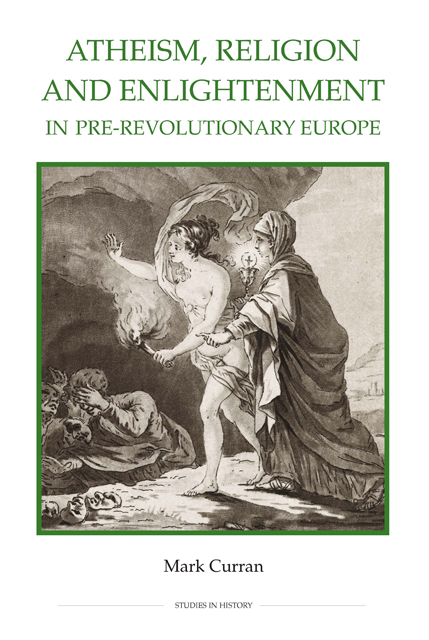Book contents
- Frontmatter
- Contents
- List of figures
- Acknowledgements
- Abbreviations
- Prologue
- Introduction
- 1 The virtuous atheist
- 2 The oral and written public sphere
- 3 Books and pamphlets
- 4 Periodicals
- 5 The philosophe response
- 6 Institutional reactions in France
- 7 The Christian Enlightenment?
- 8 Beyond the Christian Enlightenment
- Appendices
- Bibliography
- Index
5 - The philosophe response
Published online by Cambridge University Press: 14 February 2023
- Frontmatter
- Contents
- List of figures
- Acknowledgements
- Abbreviations
- Prologue
- Introduction
- 1 The virtuous atheist
- 2 The oral and written public sphere
- 3 Books and pamphlets
- 4 Periodicals
- 5 The philosophe response
- 6 Institutional reactions in France
- 7 The Christian Enlightenment?
- 8 Beyond the Christian Enlightenment
- Appendices
- Bibliography
- Index
Summary
Whilst d’Holbach was raining bombs in the house of the Lord, his fellow philosophes were nervously preparing for the fall-out. They knew how their enemies operated. The baron’s radicalism would be used to stain the reputation of the moderates amongst their number. The Système de la nature would be presented as their secret masterpiece, a representation of everything that they had always believed but never dared to publish. In their own attacks on political and ecclesiastical abuses, they had been playing a similar game for years, highlighting occasions of individual fanaticism as examples symptomatic of a wider malaise. Yet, played correctly, d’Holbach’s publications also presented a tactical opportunity. By quickly and assertively distancing themselves from his radicalism, and emphasising their distaste for extremism in all its forms, certain philosophes could present themselves as centrists in tune with public opinion. Thus Voltaire, John Turberville Needham and Frederick ii attempted unambiguously to delineate their own philosophical positions from d’Holbach’s materialism. Their responses were, almost exclusively political in nature, designed to emphasise their authors’ progressive moderation rather than to engage with d’Holbach’s ideas. A deeper engagement, on the other hand, can be found in the largely unpublished responses of those philosophes personally or philosophically close to the baron, most notably Diderot. Contemporary readers, however, were deprived of such responses, leaving d’Holbach’s works largely unanswered in public by the philosophe community, aside from on a superficial level.
In the summer of 1770, as the philosophes digested the news of the publication of the Système de la nature and contemplated its implications, Voltaire felt under some pressure to respond. His initial concern, revealed in a letter he wrote to d’Alembert dated 11 June 1770, was that his many enemies might try and finger him as its author. It was an irritating possibility, but was unlikely to represent a serious threat given that no evidence could be forthcoming. He quickly realised that the real danger lay elsewhere. First, he knew that such a high profile and radical publication gave the likes of Fréron invaluable ammunition in their attempts to reduce the philosophes to the sum of their worst parts. He would be damned by association.
- Type
- Chapter
- Information
- Publisher: Boydell & BrewerPrint publication year: 2012



